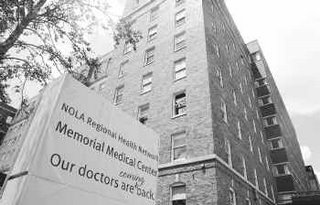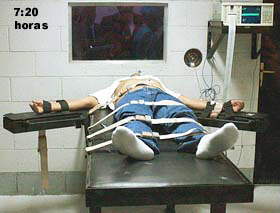 Everything a reporter might need to know to cover this story intelligently -- and the rest of us will find helpful as well -- has been collected, organized, linkified, synthesized, and analyzed by Al Tompkins at the Poynter Center in last Friday's edition of Al's Morning Meeting. Thanks to AJOB's blog for the tip.
Everything a reporter might need to know to cover this story intelligently -- and the rest of us will find helpful as well -- has been collected, organized, linkified, synthesized, and analyzed by Al Tompkins at the Poynter Center in last Friday's edition of Al's Morning Meeting. Thanks to AJOB's blog for the tip.
Health care law (including regulatory and compliance issues, public health law, medical ethics, and life sciences), with digressions into constitutional law, statutory interpretation, poetry, and other things that matter
Thursday, July 20, 2006
An excellent primer on the stem cell issue
 Everything a reporter might need to know to cover this story intelligently -- and the rest of us will find helpful as well -- has been collected, organized, linkified, synthesized, and analyzed by Al Tompkins at the Poynter Center in last Friday's edition of Al's Morning Meeting. Thanks to AJOB's blog for the tip.
Everything a reporter might need to know to cover this story intelligently -- and the rest of us will find helpful as well -- has been collected, organized, linkified, synthesized, and analyzed by Al Tompkins at the Poynter Center in last Friday's edition of Al's Morning Meeting. Thanks to AJOB's blog for the tip.
Wednesday, July 19, 2006
President signs fraudulent Fetus Farming Prohibition Act

The news stories on the president's veto haven't mentioned the other bill that was sent to him for his signature, but now that a transcript of the veto/signing ceremony is available from the White House, I can report that he has signed S.3504, the purpose of which is "to prohibit any person or entity involved in interstate commerce from: (1) soliciting or knowingly acquiring, receiving, or accepting a donation of human fetal tissue knowing that a human pregnancy was deliberately initiated to provide such tissue; or (2) knowingly acquiring, receiving, or accepting tissue or cells obtained from a human embryo or fetus that was gestated in the uterus of a nonhuman animal. Imposes fines and/or imprisonment for violations of this Act." It was introduced about a month ago, had no hearings, and produced no committee reports. The nonexistence of this "problem" was conceded by Congressman Joe Barton at the beginning of the House debate on this bill yesterday:
Cong. Rec. H5345 (July 18, 2006)(emphasis added).I rise today in the strongest possible support of S. 3504, the Fetus Farming Prohibition Act. Every so often, we deal with a subject on this floor that is so ugly that the language almost is unable to qualify and quantify that ugliness. Today is one of those moments. When you know what fetus farming is, words like obnoxious and repugnant seem timid.
As we know, fetus farming is the gruesome idea of creating a human fetus purely for research to harvest its organs. This bill would ban that practice, and we cannot ban it, in my opinion, soon enough. Most scientists today share the belief that human life should not be created just for the purposes of experimentation, or for harvesting the organs of one person to be given to another. The vast majority of scientists in our Nation uphold the ethical and moral principles on which our country forever rests, the inalienable right to life and the inherent value of human life in whatever form it may take.
These scientists are working tirelessly with the knowledge that their efforts are to benefit life, benefit humanity, not to benefit one person for profit at the detriment of another person.
Unfortunately, Mr. Speaker, we have seen clear examples in other countries that some scientists see things somewhat differently.
It is towards these scientists that the pending legislation is directed. Rather than waiting for a horror story to appear on the front pages or allowing for the possibility of scientific advancement taking us down a slippery slope, this bill gives a clear signal that fetus farming in all of its forms will not be tolerated in the
United States, nor will we allow human fetuses or embryos to be bought and sold for research like cattle.
President carries out veto threat on stem-cell measure
 The AP's Mary Dalrymple reports that President Bush has vetoed H.R.810. Here are his reported remarks:
The AP's Mary Dalrymple reports that President Bush has vetoed H.R.810. Here are his reported remarks:"This bill would support the taking of innocent human life of the hope of finding medical benefits for others. It crosses a moral boundary that our society needs to respect, so I vetoed it," Bush said at a White House event where he was surrounded by 18 families who "adopted" frozen embryos that were not used by other couples, and then used those leftover embryos to have children.
"Each of these children was still adopted while still an embryo and has been blessed with a chance to grow, to grow up in a loving family. These boys and girls are not spare parts," he said.
I suppose you can admire his consistency on this issue, though I am more inclined toward Art Caplan's comment that it's a foolish and uninformed consistency. As for the shameless display of of these 18 kids, no one (1) ever doubted that frozen embryos have the capacity to be implanted in a womb and nurtered to maturity or (2) suggested that children so produced were merely "spare parts." That comment well illustrates the vacuousness of the president's policy. And unless I miss my guess, there isn't a state in the country that allows couples to adopt an embryo. Embryo donation is expressly permitted in a number of states, and many (but not all) have paternity rules for the resulting child, but adoption of an embryo? Outside of the federally-funded Snowflakes program -- which appears to result in a purely private, contractual arrangement -- I don't know of a state that has provided for such adoptions by law.
Caplan on Bush's veto of stem-cell bill
 Art Caplan is at his best today in his column about Bush's promised veto of H.R.810. Here are the opening and closing paragraphs:
Art Caplan is at his best today in his column about Bush's promised veto of H.R.810. Here are the opening and closing paragraphs:President Bush’s embryonic stem cell policy began with lies and has now ended with one.
Bush reserved his first veto as president for one of the only valuable things this do-almost-nothing Congress has managed to actually get done.
With a flourish of a veto pen that has remained dormant no matter how dopey Congress has been, the Senate bill allowing public funding of embryonic stem cell research has been consigned to the legislative trash can. . . .
With his veto the president has now reaffirmed a policy that never made any sense, garnered no scientific support to speak of, was abandoned by both houses of Congress and the leaders of his own party and, most importantly, got no traction with those most in need of the benefits of the research — patients and their families.
The president has now told doctors, researchers and patients to drop dead. Science policy in the Bush administration is best made in the White House, not by scientists and not by Congress.
HCA nearly bought out in recent days
 The Wall Street Journal reports (link good for 7 days) that a group of private investors, including members of the founding Frist family, nearly consummated a buyout of HCA over the weekend. With a market capitalization of $17.6 billion, HCA's sale would have been one of the largest in recent memory. It apparently cratered because of the size of HCA's debt ($11 billion), which left the parties about 10% apart on the price. This morning, traders took the attempted buyout as a clear signal that HCA management regards its stock as undervalued in the market. As a result, according to a late-morning story on WSJ_online, HCA's stock price is up 1.5% this morning, while its junk bonds are down sharply.
The Wall Street Journal reports (link good for 7 days) that a group of private investors, including members of the founding Frist family, nearly consummated a buyout of HCA over the weekend. With a market capitalization of $17.6 billion, HCA's sale would have been one of the largest in recent memory. It apparently cratered because of the size of HCA's debt ($11 billion), which left the parties about 10% apart on the price. This morning, traders took the attempted buyout as a clear signal that HCA management regards its stock as undervalued in the market. As a result, according to a late-morning story on WSJ_online, HCA's stock price is up 1.5% this morning, while its junk bonds are down sharply.
Stem cell minuet proceeding almost as planned; Bush set to veto the most meaningful of three bills

 Congress' action on three stem cell bills yesterday and today's expected veto of one of them by President Bush are front-page stories in this morning's Washington Post and New York Times, as was the case in the Dallas Morning News and I suspect most of the dailies around the country. As previously discussed here, this has been a carefully choreographed performance by the Congressional leadership and the White House to give them two fairly meaningless bills (S.2754 and S.3504) the president can sign -- giving the GOP a little defense to play when their Democratic opponents this fall claim the Republicans are against stem-cell research -- as well as another bill (H.R. 810, which would extend federal research support to stem cells derived from leftover IVF embryos) whose veto will allow Republicans to point to their vigilant protection of human life from the moment of conception on.
Congress' action on three stem cell bills yesterday and today's expected veto of one of them by President Bush are front-page stories in this morning's Washington Post and New York Times, as was the case in the Dallas Morning News and I suspect most of the dailies around the country. As previously discussed here, this has been a carefully choreographed performance by the Congressional leadership and the White House to give them two fairly meaningless bills (S.2754 and S.3504) the president can sign -- giving the GOP a little defense to play when their Democratic opponents this fall claim the Republicans are against stem-cell research -- as well as another bill (H.R. 810, which would extend federal research support to stem cells derived from leftover IVF embryos) whose veto will allow Republicans to point to their vigilant protection of human life from the moment of conception on.The House voted on S. 3504 (the Fetus Farming Prohibition Act) yesterday (roll call vote 379). The Senate's roll call votes are here: S. 3504 vote, S.2754 vote, and H.R.810 vote. The only wrinkle in the whole scenario occurred when the House failed to pass an amended version of S.2754, the Alternative Pluripotent Stem Cell Therapies Enhancement Act (roll call vote 380). The bill got enough votes (273) to pass on a straight up-or-down vote, but a 2/3 vote (285 in favor) was needed to pass it on an accelerated "suspension" calendar. As a result, the president may have only one bill he can sign today, unless something happens in the House this morning. Alternatively, according to the Washington Post, it's possible the president will wait until he has all three bills before he vetoes H.R.810.
Tuesday, July 18, 2006
Tenet physician and 2 nurses arrested for murder in Louisiana
 According to the state's attorney in Louisiana, a physician and two nurses euthanized four patients in LifeCare Hospitals' long-term-care unit at Tenet's 603-bed Memorial Medical Center in New Orleans in the days after Hurricane Katrina devastated that city. (Modern Healthcare). The three were arrested, charged with four counts of second-degree murder, and released on personal recognizance bonds.
According to the state's attorney in Louisiana, a physician and two nurses euthanized four patients in LifeCare Hospitals' long-term-care unit at Tenet's 603-bed Memorial Medical Center in New Orleans in the days after Hurricane Katrina devastated that city. (Modern Healthcare). The three were arrested, charged with four counts of second-degree murder, and released on personal recognizance bonds.As reported by Associated Press (courtesy of the Houston Chronicle):
Memorial Medical had been cut off by flooding after the Aug. 29 hurricane swamped New Orleans. Power was knocked out in the 317-bed hospital and the temperature inside rose over 100 degrees as the staff tried to tend to patients who waited four days to be evacuated.
In court papers, state investigators said Pou told a nurse executive three days after the hurricane that the patients still awaiting evacuation would probably not survive and that a "decision had been made to administer lethal doses" to them.
Overdoses of morphine or Versed can stop the heart and lungs.
The allegations are that the three administered lethal doses of morphine (a pain killer) and Versed (a sedative). The AP story continues: "Tammie Holley, an attorney for about a dozen families whose relatives died at Memorial, said the presence of the sedative in addition to morphine is important in determining whether the staff members intended to kill. Versed, or midazolam, is used to induce unconsciousness before surgery, according to a medical Web site. 'If it was only morphine, there would be no way to know if they were administering it to control their pain,' Holley said.
- press release from the office of La. Attorney General Charles C. Foti, Jr., which includes the following statement: "I believe this case is a strong one and that these charges are based on sound legal and medical evidence. I also believe that there may be more arrests and victims that cannot be mentioned at this time and that this case is not over yet. While I am aware of the horrendous conditions that existed after Hurricane Katrina ravaged New Orleans and left so many stranded without food, water, electricity and the basic necessities, I believe that there is no excuse for intentionally killing another living human being. The fact is, the law was broken and it is my job to seek justice for the victims in this case. It gives me no pleasure to report what happened here today and my heart goes out to the families and loved ones of those victims."
- no press release from Tenet (press releases are posted here), although it has been quoted as saying through a spokesman: "Euthanasia is repugnant to everything we believe as ethical health care providers, and it violates every precept of ethical behavior and the law. It is never permissible under any circumstances."
Personally, I am inclined to believe that these cases involved attempts to provide pain control and relieve suffering for dying patients who last hours in a hellish environment would otherwise have been wretched. "Double-effect euthanasia" is easy to misinterpret, since so much depends upon the intent of the health-care professional, but there are medical facts that are more or less consistent with an intent to treat, as opposed to an intent to kill, and we will have to know more of those facts before a firm opinion is possible.
The AP story addresses this through Steve Miles:
Dr. Steven Miles, a professor of medicine at the University of Minnesota's bioethics center, said that instead of trying to kill, it is more likely that those charged were trying to relieve patients' pain "in a resource-poor environment and were doing the best they could."
He said that there are documented cases where patients have required seemingly lethal morphine doses to relieve extreme pain, and that he doubts the charges will be proven. "I'm inclined to believe this was palliative sedation that's been misread," Miles said.
Mercy killings would be "not only highly frowned upon, but also rare," Miles said. "It's highly unlikely that's what happened here."
Art Caplan and Steve Miles are also quoted in a later AP story, "Ethicists: No Way to Justify Mercy Deaths" (courtesy of Newsday).
Monday, July 17, 2006
Union boss to Fortune 500 CEO's: let's reform health care together
 Andy Stern is president of the Service Employees International Union and in today's Wall Street Journal (link good for at least 7 days), he makes the case for moving health care away from the employer-provided model and toward "a universal system that provides affordable coverage, choice of doctors and insurance plans, core benefits, and shared financing among employers, employees and government." Government leaders won't do the job, Stern writes, so it's up to the CEOs -- "the people who revolutionized medicine, communication, technology, entertainment and investing" -- to provide the leadership on health-care reform.
Andy Stern is president of the Service Employees International Union and in today's Wall Street Journal (link good for at least 7 days), he makes the case for moving health care away from the employer-provided model and toward "a universal system that provides affordable coverage, choice of doctors and insurance plans, core benefits, and shared financing among employers, employees and government." Government leaders won't do the job, Stern writes, so it's up to the CEOs -- "the people who revolutionized medicine, communication, technology, entertainment and investing" -- to provide the leadership on health-care reform.
Saturday, July 15, 2006
SSRN roundup: health law
 The 5 top-downloaded health law articles on SSRN:
The 5 top-downloaded health law articles on SSRN:- Safe Storage Gun Laws: Accidental Deaths, Suicides, and Crime
Yale Law School, Law & Economics Working Paper No. 237
John R. Lott Jr. and John E. Whitley
American Enterprise Institute (AEI) and University of Adelaide - School of Economics
Date Posted:May 22, 2000
Last Revised:June 10, 2002
Working Paper Series 8966 downloads - Abortion and Crime: Unwanted Children and Out-of-Wedlock Births
Yale Law & Economics Research Paper No. 254
John R. Lott Jr. and John E. Whitley
American Enterprise Institute (AEI) and University of Adelaide - School of Economics
Date Posted:May 16, 2001
Last Revised:June 5, 2001
Working Paper Series 5758 downloads - Stability, Not Crisis: Medical Malpractice Claim Outcomes in Texas, 1988-2002
Columbia Law and Economics Working Paper No. 287
U Illinois Law & Economics Research Paper No. LE05-002
U of Texas law, Law and Econ Research Paper No. 030
Journal of Empirical Legal Studies, Vol. 2, pp. 207-259, 2005
Bernard S. Black , Charles Silver , David A. Hyman and William M. Sage
University of Texas at Austin - School of Law , University of Texas Law School , University of Illinois College of Law and Columbia Law School
Date Posted:October 25, 2005
Last Revised:January 23, 2006
Accepted Paper Series
1624 downloads - What the Publisher Can Teach the Patient: Intellectual Property and Privacy in an Era of Trusted Privication
Stanford Law Review, Vol. 52
Jonathan Zittrain
Oxford Internet Institute
Date Posted:March 9, 2000
Last Revised:June 30, 2000
Accepted Paper Series
1248 downloads - TRIPs, Pharmaceuticals, Developing Countries, and the Doha 'Solution'
U Chicago Law & Economics, Olin Working Paper No. 140
Alan O. Sykes
University of Chicago Law School
Date Posted:February 19, 2002
Last Revised:March 7, 2002
Working Paper Series
1026 downloads
Capital punishment and organized medicine: still a no-go in Mo.
 As reported in this morning's New York Times, U.S. District Judge Fernando J. Gaitan, Jr., previously "had demanded an overhaul of the system after the doctor who now mixes the drugs for the state described an improvised process that Judge Gaitan found so chilling that he temporarily barred executions in Missouri."
As reported in this morning's New York Times, U.S. District Judge Fernando J. Gaitan, Jr., previously "had demanded an overhaul of the system after the doctor who now mixes the drugs for the state described an improvised process that Judge Gaitan found so chilling that he temporarily barred executions in Missouri."The nub of the problem, of course, is that "[t]he American Society of Anesthesiologists and the American Medical Association [Op. E-2.06] say physicians should not take part in executions, and Orin F. Guidry, the president of the A.S.A., recently issued a letter to members reiterating that position in light of the Missouri ruling." Dr. Guidry's description of the ASA position on physician participation is a little more nuanced than The Times lets on, but the ASA apparently comes out the same place as the AMA: "ASA does not have a detailed position on anesthesiologist participation in lethal injection but the 2001 House of Delegates 'Approved a recommendation that ASA support the American Medical Association’s position regarding physician nonparticipation in executions.' . . . . Clearly an anesthesiologist complying with the Missouri ruling – and despite this court’s position on ethical obligations - would be violating the AMA position which ASA has adopted. It is my belief that the court cannot modify physicians’ ethical principles to meet its needs."In a sworn deposition, the Missouri doctor, whose name is being withheld by the state, acknowledged that he had sometimes given the condemned a smaller dose of anesthesia — used to reduce the pain of the lethal drugs to come — than the state had said was its policy.
The doctor said he was solely responsible for counting out dosage amounts of the three drugs administered in sequence, knew of no written protocol by the state for carrying out executions and was at times “improvising.”
He also said he is dyslexic, sometimes mixing up phone numbers or cable bill account numbers. “So it’s not unusual for me to make mistakes,” the doctor, identified in court records as John Doe I, said.
He indicated in his testimony, however, that he had made no mistakes in his death chamber work and that the mistakes elsewhere were “not medically crucial.”
Judge Gaitan said he was “gravely concerned” about the doctor’s dyslexia and criticized the lack of “checks and balances,” ruling on June 26 that the state was subjecting the condemned to “an unnecessary risk that they will be subject to unconstitutional pain and suffering when the lethal injection drugs are administered.”
The judge ordered Missouri to hire a board-certified anesthesiologist (John Doe I is a surgeon), and gave the state until today to submit a formal, written set of procedures, including increased monitoring of inmates and an assurance of sufficient anesthetic drugs.
But in the state’s filing last night, officials said they had sent letters to 298 certified anesthesiologists who reside anywhere near the state’s death chamber in Bonne Terre, and were turned down by all of them.
Guidry ends his letter with some blunt observations:
We are being reluctantly placed on a slippery slope. If the courts demand that inmates be sufficiently anesthetized, then I would have to agree with the court that the only way to assure that would be to have an anesthesiologist prepare and administer the drugs, carefully observe the inmate and all pertinent monitors, and finally to integrate all this information. I don’t think that any of us would want to say that untrained individuals under current death chamber conditions can reliably produce a satisfactory level of unconsciousness. Our core skill is that we can induce an appropriate level of anesthesia. Are we willing to say that untrained individuals can also do so with a reasonable degree of success?
However if the only way to accomplish this appropriate level of anesthesia is with an anesthesiologist using all of our tools AND anesthesiologists will not participate, then are anesthesiologists stopping capital punishment and making public policy?
Not in my opinion. Lethal injection was not anesthesiology’s idea. American society decided to have capital punishment as part of our legal system and to carry it out with lethal injection. The fact that problems are surfacing is not our dilemma. The legal system has painted itself into this corner and it is not our obligation to get it out.
Friday, July 14, 2006
Has the Texas legislature made performing abortions a capital offense?
 That's the question raised by a recent request for an Attorney General's Opinion (RQ-0501-GA). The literal question posed by David Swinford (R) (chair of the House Committee on State Affairs) is a bit more technical than that, of course:
That's the question raised by a recent request for an Attorney General's Opinion (RQ-0501-GA). The literal question posed by David Swinford (R) (chair of the House Committee on State Affairs) is a bit more technical than that, of course:Does a physician’s failure to comply with the requirements of either § 164.052(a)(18) (restricting third-trimester abortions performed on viable unborn children) or § 164.052(a)(19) (requiring parental consent for abortions performed on unemancipated minors) of the Texas Occupations Code, as provided by § 1.42 of S.B. 419 (2005 TEX. GEN. LAWS ch 269, § 1.42) subject the physician to liability under the criminal homicide provisions of ch. 19 of the Penal Code?
As reported in this morning's Kaiser Daily Women's Health Report, which drew heavily from a story in yesterday's Austin Statesman-American, Swinford wants to test an interpretation of the new law by the Texas District and County Attorneys Association:
The analysis says that because it is illegal both for abortions to be performed on a minor without the consent of a parent or guardian and for a physician to perform a third-trimester abortion, doctors who perform them could be prosecuted for murder. The analysis -- written by Shannon Edmonds, the group's director of governmental relations -- says, "This was undoubtedly an unintended consequence but one that law enforcement authorities should be aware of." Edmonds, who said he is unaware of any such prosecutions, said, "After every (legislative) session, there are changes in the law that are real head-scratchers, some intentional and some are unintentional. ... This is just a way to illustrate how unintentional consequences can result in something extreme" (Embry, Austin American-Statesman, 7/13). Swinford, who disagrees with the interpretation of the law by the TDCAA, said the law is intended to provide
criminal penalties for the failure of physicians to obtain parental consent or to comply with restrictions on abortions conducted at or after 28 weeks' gestation, but "certainly not to subject a physician to prosecution for capital murder."
Both the Kaiser report and the news story missed a crucial part of the story. Shannon Edmonds' analysis turns on a little-discussed amendment to the Penal Code in 2003 that expanded the definition of "individual" in the homicide portion of the Penal Code to include an unborn child at any stage of development starting at conception. Although the Penal Code exempts physicians who perform lawful abortions, that exemption wouldn't apply to physicians who perform unlawful abortions. And since the 2005 amendments to the Occupations Code make it unlawful for a physician to perform most late-term abortions or abortions on minors without parental consent (subject to a judicial-bypass provision), the argument would be that physicians who violate the new provisions would fall outside the 2003 law's exception for lawful abortions.
This is almost undoubtedly not what the legislature intended. With the Texas Legislature, though, you can never be quite sure. And by providing specific, lesser penalties for violations of the Occupations Code, the Legislature could be understood to have intended these penalties as an alternative to the Penal Code's death penalty. But when it comes to harsh penalties and the Texas Legislature, you can never be quite sure.
Thursday, July 13, 2006
Pain control and end-of-life care are not simply their own reward
 Excellence in end-of-life care and pain management are also sometimes rewarded by others, in this case by the AHA, which recently gave nurse practitioner Peg Nelson and St. Joseph Mercy Hospital in Pontiac, MI, its Circle of Life Award (which includes $10,000). This article from the Detroit Free Press has the details of their approach to end-of-life care.
Excellence in end-of-life care and pain management are also sometimes rewarded by others, in this case by the AHA, which recently gave nurse practitioner Peg Nelson and St. Joseph Mercy Hospital in Pontiac, MI, its Circle of Life Award (which includes $10,000). This article from the Detroit Free Press has the details of their approach to end-of-life care.
Senate votes to allow drug reimportation by individuals
 On Tuesday, the Senate approved (68-32) S. Amdmt. 4548 to H.R. 5441 (Department of Homeland Security Appropriations Act, 2007): "To prohibit the United States Customs and Border Protection from preventing an individual not in the business of importing a prescription drug from importing an FDA-approved prescription drug." As reported by The New York Times on Wednesday, the House is unlikely to get a chance to vote on the Senate's amendment: "[A]ides said that as in past years, the provision was likely to be removed when the legislation got to a conference committee of House and Senate lawmakers who will negotiate the final version."
On Tuesday, the Senate approved (68-32) S. Amdmt. 4548 to H.R. 5441 (Department of Homeland Security Appropriations Act, 2007): "To prohibit the United States Customs and Border Protection from preventing an individual not in the business of importing a prescription drug from importing an FDA-approved prescription drug." As reported by The New York Times on Wednesday, the House is unlikely to get a chance to vote on the Senate's amendment: "[A]ides said that as in past years, the provision was likely to be removed when the legislation got to a conference committee of House and Senate lawmakers who will negotiate the final version."Drug reimportation is extremely popular with voters, but Sen. Judd Gregg (R-N.H.) had his own reasons for opposing reimportation: "Referring to a leading cholesterol-lowering drug, . . . Gregg . . . said, 'If I were a creative terrorist, I would say to myself, "Hey, listen, all I’ve got to do is produce a can here that says ‘Lipitor’ on it, make it look like the original Lipitor bottle, which isn’t too hard to do, fill it with anthrax."'" But, hey, who needs to be a creative terrorist when our senators are dreaming up doomsday scenarios and sharing them with the national press corps?! And in any event, what's to stop that terrorist from doing the same thing with a bottle of Tylenol right here in the U.S.? Sorry, Senator, your argument doesn't persuade me that the Administration's (and your) opposition to reimportation is about anything more than keeping profits up for Big Pharma. Sure, there are a handful of drugs for which special handling (such as refrigeration) is required to avoid a loss in potency, but those can be excluded from the rule that allows reimportation, or special requirements can be added to try to ensure drug safety.
Wednesday, July 12, 2006
NYC unveils pandemic preparedness plan
 From today's CDC Public Health Law News:
From today's CDC Public Health Law News:"City unveils a plan to identify, and contain, a flu pandemic" -- The New York Times (07/11/06) Diane Cardwell [link]
New York City Mayor Michael R. Bloomberg and city health commissioner Thomas R. Frieden this week announced a new plan to address avian influenza preparedness. The plan details the steps for identifying and containing an outbreak and distributing scarce resources such as antiviral medications. "The fact that New York is a major gateway to the nation and one of the world's most densely populated cities means the possibility of pandemic flu, however remote, is one that we must take extremely seriously," said Bloomberg. The plan stresses early detection to help contain the pandemic, so health officials have taken steps to strengthen communication with doctors and to monitor information about ambulance runs, pharmacy sales, and emergency room visits. In the event of an outbreak, in which the city estimates more than 2.5 million New Yorkers could be infected, officials said they would use traditional methods of containing the virus by encouraging certain behaviors among the public. "It's low technology, but it works: covering your mouth when you cough or sneeze; not going out if you have fever and cough. These are very important things people can do to reduce the spread of infection, and if there were a pandemic, they would be our first line of defense," said Frieden.
[Editor's note: To read the New York City Pandemic Influenza Preparedness and Response Plan, click here.]
Senate stem-cell vote set for next Tuesday
 Laurie Kellman of The Washington Post has the story on the upcoming Senate vote on three stem-cell research bills, which were first discussed here two weeks ago:
Laurie Kellman of The Washington Post has the story on the upcoming Senate vote on three stem-cell research bills, which were first discussed here two weeks ago:The Senate will vote next week on three bills related to stem-cell research, including a measure that would expand federal funding for a procedure that uses and destroys human embryos in the drive to cure diseases that afflict millions of Americans [H.R. 810].
The Senate is expected to pass that bill, which would send it to the White House for President Bush's signature. Bush has promised to veto the measure, effectively killing it because neither chamber of Congress has displayed the two-thirds majority needed to override it.
That would be the end of the story, a victory for social conservatives, but for two issues: The Senate debate set to open Monday occurs late in a year of midterm elections, and polls show 70 percent of Americans support the embryonic stem cell bill.
So Senate Majority Leader Bill Frist, R-Tenn., who supports the bill and has spent a year trying to bring it to the floor, succeeded last week by promising opponents to also hold votes on two other stem cell measures they could support and Bush could sign [S.2754 and S.3504].
In a delicate election-year balancing act, Frist also will bring up a measure that would ban so-called "fetal farming," described as growing fetuses for the sole purpose of harvesting tissue. The other would fund research for stem cells derived from adults.
The House would then act quickly to pass the two non-controversial bills and all three would be sent to Bush for his signature. Bush would veto the embryonic bill and sign one or both of the others, giving him and social conservatives in Congress fresh evidence to present to voters this fall that they support stem cell research.
Monday, July 10, 2006
 The current issue of Health Affairs is dedicated to public health. There are some terrific articles, but I particularly commend these:
The current issue of Health Affairs is dedicated to public health. There are some terrific articles, but I particularly commend these:- Can Public Health And Medicine Partner In The Public Interest? [link]
J. Michael McGinnis
Abstract: The dominant issues for health and health care today can be effectively engaged only if public health and medicine work together as better partners. Yet historical, professional, organizational, operational, and financial barriers exist to closer relationships. Fostering the necessary collaboration will require changes for both public health and medicine in leadership styles, professional education, practice incentives, accountability measures, and financing structures.
- What Does Social Justice Require For The Public’s Health? Public Health Ethics And Policy Imperatives [link]
Lawrence O. Gostin and Madison Powers
Abstract: Justice is so central to the mission of public health that it has been described as the field’s core value. This account of justice stresses the fair disbursement of common advantages and the sharing of common burdens. It captures the twin moral impulses that animate public health: to advance human well-being by improving health and to do so particularly by focusing on the needs of the most disadvantaged. This Commentary explores how social justice sheds light on major ongoing controversies in the field, and it provides examples of the kinds of policies that public health agencies, guided by a robust conception of justice, would adopt.
Sunday, July 09, 2006
NH court: Doc has 1st Amendment right to be a jerk
 As reported by the Associated Press, New Hampshire judge Edward Fitzgerald "has ordered the state Board of Medicine to stop disciplinary proceedings against a doctor accused of telling a patient she was so obese she might only be attractive to black men and advising another to shoot herself following brain surgery." The article reports that Terry Bennett, M.D., says "he planned to sue everyone involved for 'malicious prosecution.'
As reported by the Associated Press, New Hampshire judge Edward Fitzgerald "has ordered the state Board of Medicine to stop disciplinary proceedings against a doctor accused of telling a patient she was so obese she might only be attractive to black men and advising another to shoot herself following brain surgery." The article reports that Terry Bennett, M.D., says "he planned to sue everyone involved for 'malicious prosecution.'"'I am not inclined to be forgiving about it,' he said. 'It's been devastating and infuriating.'"
New Hampshire Public Radio aired a good piece on the matter, including comments by medical ethicist Larry McCullough (tough love -- and tough speech -- may be what the doctor ordered and is within the bounds of standard medical practice) and Vermont medical professor Virginia Hood (offensive speech can cause harm).
There are a few excerpts from the judge's opinion in an article in the Manchester Union-Leader.
This case raises some interesting issues. First, can it possibly be true that a medical board can't decide that certain speech constitutes unprofessional conduct and punish a licensee for engaging in such conduct, even if the speech is otherwise protected by the First Amendment? And second, the First Amendment cuts both ways. Recall the 2002 Ninth Circuit decision that First Amendment rights of physicians meant the federal government couldn't revoke the drug licenses of California physicians who recommended marijuana to their patients (Conant v. Walters).
Thursday, July 06, 2006
Many hospice patients live longer than expected
 Terrific story (via Kaiser Family Foundation's Daily Health Policy Report) about hospice:
Terrific story (via Kaiser Family Foundation's Daily Health Policy Report) about hospice:McClatchy Newspapers/St. Paul Pioneer Press on Wednesday examined how some patients who check into hospices believing they are near death later go on to recover and leave hospice care. For Medicaid and Medicare beneficiaries to cover hospice care, the patient's doctor and the hospice's doctor must agree that the patient will die within six months. About two-thirds of hospice patients die within 30 days, according to the National Center for Health Statistics at CDC. If a patient does survive six months but is not likely to survive another six months, the patient remains in hospice. Patients who survive six months are discharged if their condition has improved and stabilized enough that they are likely to live another six months. According to CDC data, an estimated 100,000 hospice patients will leave hospice care this year. One study estimates that about one-third of those who leave hospice die within six months of their release. About 5,000 to 20,000 hospice survivors annually "live on with evident satisfaction," while the remainder is transferred to nursing homes, according to McClatchy/Pioneer Press.
Explanation
Experts say there are several factors that can lead terminally ill patients to recover enough to leave hospice care. In many cases, doctors inaccurately estimated how long a patient had to live, McClatchy/Pioneer Press reports. According to McClatchy/Pioneer Press, predicting how long a hospice patient will live might be more difficult today than it was in the 1970s and 1980s, when
three-quarters of hospice patients were admitted because of cancer. By contrast, nearly half of current hospice patients have dementia or heart, lung, kidney or liver failure -- which can make the length of a patient's decline less predictable. "Another theory ... is that pending death brings out the curative power of family and friends," McClatchy/Pioneer Press reports. In addition, some experts say patients might improve in hospice because they are receiving better care than before they entered facilities (Greve, McClatchy/St. Paul Pioneer Press, 7/5).
The article doesn't mention the ill-fated trial balloon from CMS a few years back, in which they proposed to recoup hospice benefits paid to Medicare beneficiaries who didn't die within 6 months!
Also: If you have trouble with the link provided above to the news article (I did!), try this one. Free registration may still be required, but at least the article (eventually) appears on your screen. . . .HPV debate moves to the states
 On June 30 Stateline.org published a useful summary of the issues surrounding the recently recommendation from the CDC's Advisory Committee on Immunization Practices that all 11- and 12-year-old girls receive the vaccine for the most dangerous strains of human papillomavirus (HPV), which causes cervical cancer. As a public health matter, the advisory committee's recommendation is pretty straightforward. But the politics of abortion, always lurking just below the surface of any discussion of public policy and sex, promise to alter the debate in many states:
On June 30 Stateline.org published a useful summary of the issues surrounding the recently recommendation from the CDC's Advisory Committee on Immunization Practices that all 11- and 12-year-old girls receive the vaccine for the most dangerous strains of human papillomavirus (HPV), which causes cervical cancer. As a public health matter, the advisory committee's recommendation is pretty straightforward. But the politics of abortion, always lurking just below the surface of any discussion of public policy and sex, promise to alter the debate in many states:. . . HPV is a sexually transmitted disease. The distinction already is spurring some conservative groups to say states shouldn’t mandate that girls get the vaccine, because the only way to catch the cancer-causing disease is through sexual contact.
Linda Klepacki, an analyst on sexual health for Focus on the Family, which promotes abstinence until marriage, said the reason for inoculating schoolchildren for diseases like measles doesn’t apply to the cervical cancer vaccine.
“HPV cannot be communicated by sitting in a public school classroom. It’s communicated only by sexual behavior. Because of that reason, we believe that parents should be the primary decision makers. . . . It’s not something you can catch, but it’s something you really have to go out and get,” she said.
Klepacki acknowledged that women who remain celibate until marriage still could be at risk, if their husbands contracted the virus earlier.
Wednesday, July 05, 2006
NEJM Perspective on Roe
 There's an excellent (and free) article on Roe and partial-birth abortion in this week's New England Journal of Medicine. The authors leave no room for doubt as to their position on legal abortions, including late-term procedures, but their article is no more polemic: it's reasoned and supported by data and careful argument, ending with these four paragraphs:
There's an excellent (and free) article on Roe and partial-birth abortion in this week's New England Journal of Medicine. The authors leave no room for doubt as to their position on legal abortions, including late-term procedures, but their article is no more polemic: it's reasoned and supported by data and careful argument, ending with these four paragraphs:Watson Bowes, emeritus professor of obstetrics and gynecology at the University of North Carolina, is among those who argue that Roe v. Wade is a misuse of federal authority: "The Supreme Court used raw judicial power to trump state legislators, and the decision should be overturned on those grounds." Other antiabortion activists advocate incremental changes in state laws to limit the provision of abortion. These changes include parental consent laws, fetal homicide laws (making it two crimes to kill a pregnant woman), strict regulations for abortion clinics, and legislation requiring physicians to offer women fetal ultrasonography before an abortion.
This strategy is already having an effect, argued Katherine Grainger, legislative counsel at the Center for Reproductive Rights. "With each year, more and more restrictions on Roe are being passed." Ultimately, Grainger said, "we'll see it slowly eviscerated to the point where . . . it's hollow."
Many older abortion providers believe that the complacency of younger women and physicians is partially responsible for the current state of affairs. "They don't remember the thousands of women who died from septic abortions," argued Edelin. "They don't realize that this is a battle to save women's lives — not a battle for choice."
As new legislation is passed, the courts will hear more cases that challenge Roe, and physicians may increasingly risk their careers and their lives if they choose to provide abortions. With each new decision to limit abortion, more American women lose their access. Whether the Supreme Court ultimately upholds or overturns the Partial-Birth Abortion Ban Act, one thing is certain: poor women in rural America are bearing the brunt of these decisions, and some may pay with their lives.